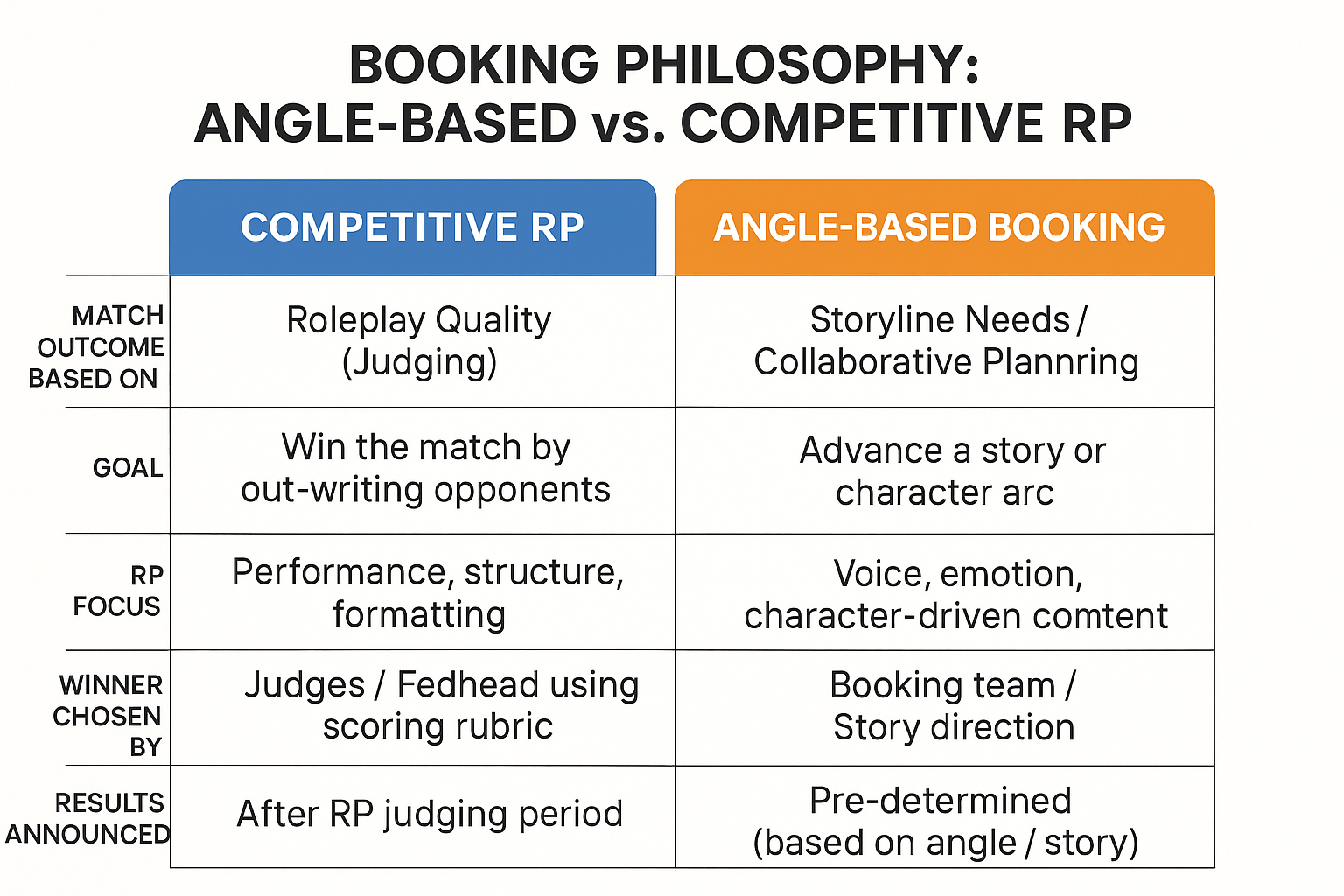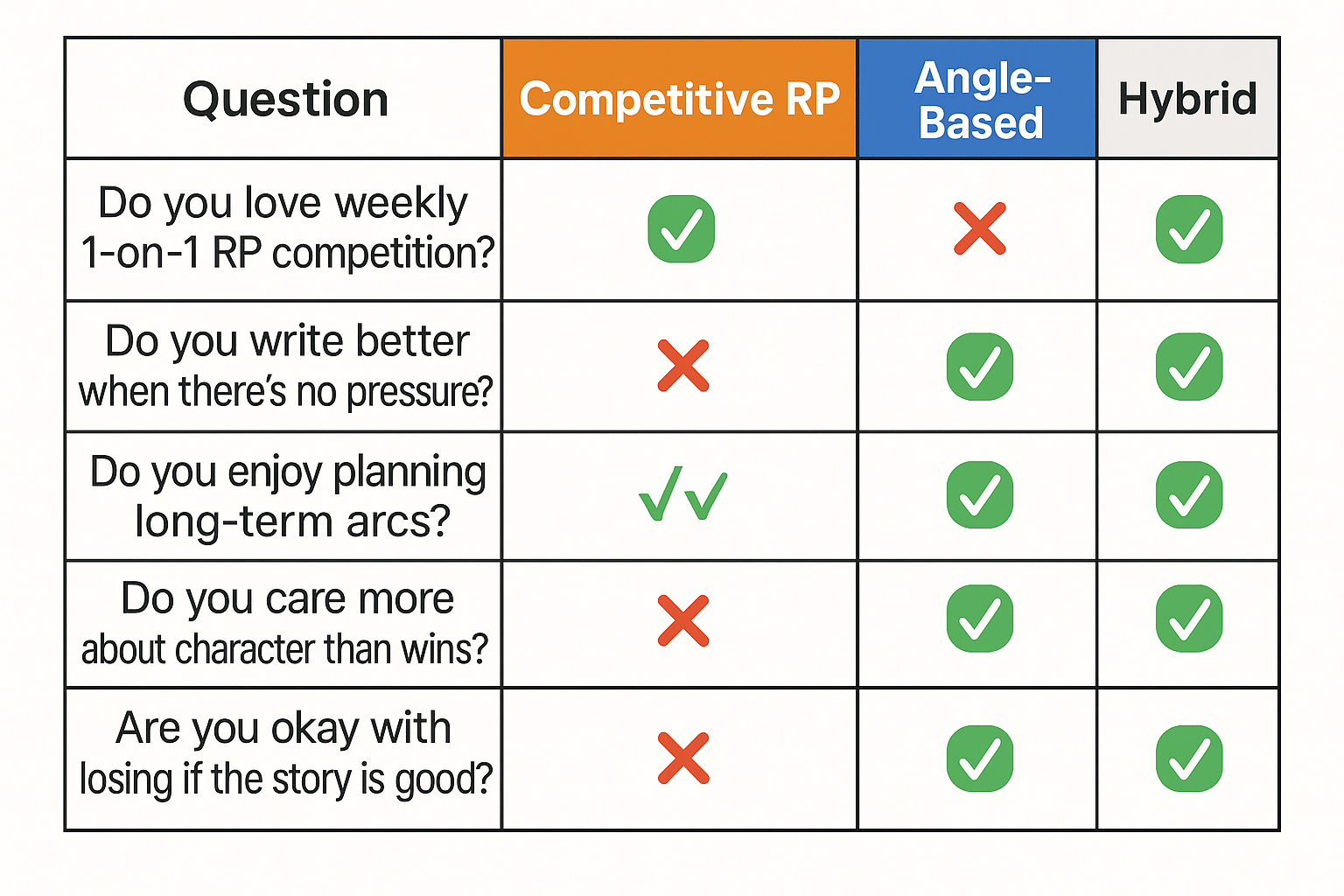Booking Philosophy: Angle-Based vs. Competitive RP – Which System Builds a Better Fed?
Posted on June 29, 2025
By The Armchair Booker
Ask any veteran handler what kind of fed they prefer, and you’ll likely hear one of two answers:
-- “I want wins to be earned. Let the best RP win.”
-- “I care about story. Let the outcome serve the angle.”
Welcome to the long-running debate at the heart of eWrestling: Angle-Based vs. Competitive RP — which booking philosophy creates the best experience?
There’s no “one size fits all” approach. But understanding the pros, cons, and hybrid options of each system can help Fedheads build healthier, longer-lasting communities — and help handlers find the right home for their style.

🥇 Competitive RP Booking: The Purist’s Playground
In competitive RP feds, matches are judged based strictly on roleplay quality. You win by writing better than your opponent — period.
✅ Pros:
-- Meritocracy: Wins and titles are earned through writing skill and effort.
-- Clear stakes: Every match matters. The path to the top is transparent.
-- Incentivizes improvement: Handlers sharpen their craft week after week.
❌ Cons:
-- Burnout is real: Constantly writing at high levels can be exhausting.
-- Subjectivity creeps in: No matter how "objective" the judging, bias and inconsistency can still influence outcomes.
-- Story sometimes suffers: Focus shifts to winning, not telling a cohesive narrative. Characters can feel like tools in a points-based game.
📣 "When you're writing to win, you're often writing for the judge — not the character."
🎭 Angle-Based Booking: The Storyteller’s Stage
Angle-based feds focus on story first. Match outcomes are booked based on narrative needs, character arcs, and collaborative planning. RP is still encouraged (and often required), but winning isn't purely based on RP quality.
✅ Pros:
-- Long-term storytelling thrives: Feuds can develop naturally without the pressure of constant “must-win” RPs.
-- Creative freedom: Handlers can take risks without fear of losing because of an unconventional approach.
-- Burnout-friendly: Writers can focus on quality over quantity, and still remain relevant.
❌ Cons:
-- Perception of favoritism: If outcomes aren't based on clear criteria, handlers may feel excluded or frustrated.
-- Lower competitive tension: Some handlers miss the adrenaline of “head-to-head” writing battles.
-- Harder to onboard new talent: New players may feel out of the loop if they’re not plugged into existing storylines.
🧠 “You don’t always win the match — but your character always wins something narratively.”
⚖️ The Hybrid Model: Best of Both Worlds?
Many modern feds blur the lines — using a hybrid system.
-- Lower card matches might be judged competitively.
-- Main event feuds are booked with collaborative storytelling.
-- “Feud Points” or OOC input may weigh into key matches.
-- Handler consistency, reliability, and effort are considered alongside roleplay quality.
This gives structure and flexibility. The strongest hybrid feds communicate expectations clearly, reward participation, and emphasize growth — not just wins.
💬 “Write to win. Plan to lose. Always tell a story.”
💡 So… Which System Is Better?
That depends on what kind of experience you’re looking for.

A great fed knows what it is and sticks to it. A bad fed is unclear, inconsistent, or changes systems mid-run — causing confusion and frustration.
🏁 Final Bell: Know Your Fed, Know Your Game
If you're a handler:
-- Ask questions before joining. How are matches decided? How are RPs judged or factored in?
-- Be honest about your goals: do you want titles, stories, or both?
If you're a Fedhead:
-- Define your booking philosophy in your rules.
-- Set transparent expectations.
-- Make room for different play styles — but stay true to your core model.
Whether it’s competition or collaboration, the best feds aren’t about who wins the match… They’re about who tells the best story — and makes people care enough to see what happens next.
